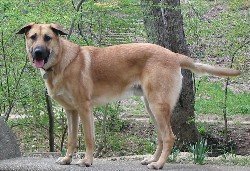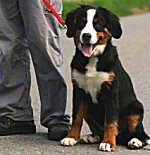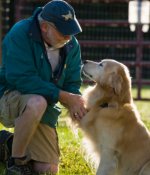Chinook Dogs: What's Good About 'Em, What's Bad About 'Em
Chinook temperament, personality, training, behavior, pros and cons, advice, and information, by Michele Welton, Dog Trainer, Behavioral Consultant, Author of 15 Dog Books

Characterized by his dependable nature, sensible energy level, and sound working ability, the versatile Chinook is both frisky and dignified.
He enjoys vigorous outdoor exercise such as backpacking, carting, agility, weight pulling, and especially recreational sledding and ski-joring.
However, he is not a workaholic. If he is provided with reasonable physical and mental outlets for his enthusiasm, he is happy to settle on the sofa during quiet times.
Very people-oriented, Chinooks require daily companionship (either by humans or other dogs) and can become bored and destructive if left alone too much.
Gentleness and non-aggression are his hallmarks. Most will bark to announce visitors, but that's the extent of their guarding inclination.
All sweet-natured, slightly reserved breeds have the potential for submissiveness and shyness, and this is true of the Chinook. Early socialization is required to build a confident temperament.
Usually peaceful with other animals, he can be a chaser of rodents and trespassing cats.
Chinooks are independent thinkers who may use their problem-solving skills to open gates and cupboards. They are also slow to mature, acting like big puppies for several years.
If you want a dog who...
- Is medium to large, natural-looking, strong and athletic
- Has a handsome thick coat in earthtone shades
- Comes in a variety of builds, sizes, coats, and ear types
- Has a true working heritage and thrives on exercise and athletic activities
- Is steady and dependable
- Is polite with strangers, and usually with other pets
A Chinook may be right for you.
If you don't want to deal with...
- Providing a goodly amount of exercise
- Rowdiness and exuberant jumping, especially when young
- Destructiveness when bored or not exercised enough
- Shyness or fearfulness in some lines, or when not socialized enough
- An independent mind of his own, requiring a confident owner who can take charge
- Heavy shedding
- Waiting lists (very hard to find)
A Chinook may not be right for you.
 |
Dog Breed Traits – Which Traits Are Right For You? In this brand new series, I'll help you decide which dog breed traits would best suit you and your family, your home and yard, and your lifestyle, so you can choose the best dog breed for your family. |
Keep in mind that the inheritance of temperament is less predictable than the inheritance of physical traits such as size or shedding. Temperament and behavior are also shaped by raising and training.
FREE eBooks by Michele Welton
![]() "Respect Training for Puppies" and "Teach Your Dog 100 English Words" are free step by step guides to teaching your pup to be calm and well-behaved.
"Respect Training for Puppies" and "Teach Your Dog 100 English Words" are free step by step guides to teaching your pup to be calm and well-behaved.
![]() "11 Things You Must Do Right To Keep Your Dog Healthy and Happy" is a free guide to keeping your dog mentally, physically, and emotionally happy and healthy so you can enjoy a longer lifetime of companionship.
"11 Things You Must Do Right To Keep Your Dog Healthy and Happy" is a free guide to keeping your dog mentally, physically, and emotionally happy and healthy so you can enjoy a longer lifetime of companionship.

More traits and characteristics of the Chinook
If I was considering a Chinook, I would be most concerned about...
- Providing enough exercise. Chinooks are active dogs who love the outdoors. They need regular opportunities to run and play, to vent their energy and do interesting things. Otherwise they will become bored – and dogs usually express boredom by making noise and destructive chewing.
- Providing enough socialization. Standoffish by nature, Chinooks need extensive exposure to people and to unusual sights and sounds. Otherwise their natural caution can become shyness, which is difficult to live with.
- The independent temperament. Chinooks want to do things their own way and can be stubborn. You must show them, through absolute consistency, that you mean what you say. To teach your Chinook to listen to you, read my free online training programs.
- Heavy shedding. Chinooks shed a LOT. You need to be okay with hair on your clothing and furnishings
- Finding one and paying the price. Only about a dozen Chinook litters are produced each year.
My best-selling books – now available FREE on my website
 Respect Training For Puppies: 30 seconds to a calm, polite, well-behaved puppy is for puppies 2 to 18 months old. Your puppy will learn the 21 skills that all family dogs need to know. Click here to read for free.
Respect Training For Puppies: 30 seconds to a calm, polite, well-behaved puppy is for puppies 2 to 18 months old. Your puppy will learn the 21 skills that all family dogs need to know. Click here to read for free. Teach Your Dog 100 English Words is a unique Vocabulary and Respect Training Program that will teach your adult dog to listen to you and do what you say. Click here to read for free.
Teach Your Dog 100 English Words is a unique Vocabulary and Respect Training Program that will teach your adult dog to listen to you and do what you say. Click here to read for free. 11 Things You Must Do Right To Keep Your Dog Healthy and Happy helps your dog live a longer, healthier life. Get my honest advice about all 11 Things before you bring home your new puppy, because some mistakes with early health care cannot be undone. Click here to read for free.
11 Things You Must Do Right To Keep Your Dog Healthy and Happy helps your dog live a longer, healthier life. Get my honest advice about all 11 Things before you bring home your new puppy, because some mistakes with early health care cannot be undone. Click here to read for free.Related posts you might enjoy






